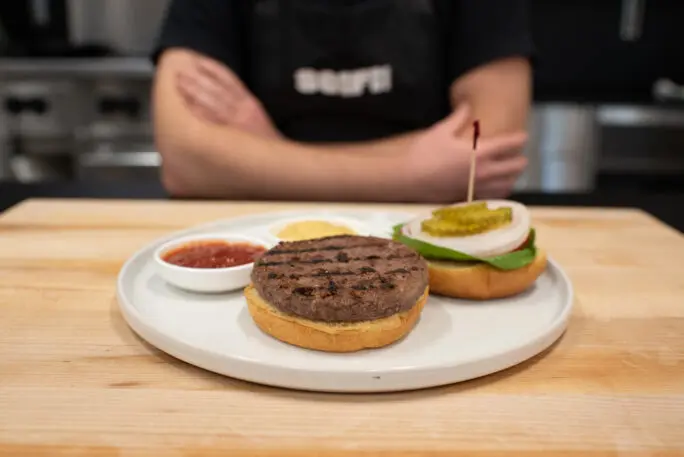Say you’re the CEO of a tech startup promising to create meat of the future. Your smarter colleagues—the ones with PhDs—are elbow high in petri dishes. Their job is to grow monumental amounts of animal muscle cells; around 10 trillion are needed to make one measly steak. Your job is to convince investors that this mission is viable, and worth billions.

Joshua March is that CEO. He’s the cofounder of SciFi Foods (formerly Artemys Foods), a cultivated meat startup based in San Leandro, an industrial town east of San Francisco. He’s the business guy in a sector that may never come to fruition, but he’s convinced investors that one day, in our nebulous future, it will. This is the fourth company he’s led. The last one, Conversocial, helped companies manage customer service via social channels and was acquired for $50 million.
How does an entrepreneur move from enterprise software as a service to cultivating meat from cells? Perhaps the better question is what took him so long to get to it. March tells me that he became “obsessed” with cultivated meat after reading about it in The Player of Games, a 1988 science fiction novel by Iain M. Banks that is beloved by techies.
There: that red-black scent of roasted meat; blood-quickening, salivatory; tempting and vaguely disagreeable at the same time as separate parts of his brain assessed the odour. The animal root smelled fuel; protein-rich food; the mid-brain trunk registered dead, incinerated cells . . . while the canopy of forebrain ignored both signals, because it knew his belly was full, and the roast meat cultivated.
—Iain M. Banks, The Player of Games
For a while, March sat on the sidelines running other startups. “I didn’t think I had to do anything,” he says, “that it would happen on its own.” But years ticked by, and there was little advancement in what was then usually referred to as lab-grown meat. “I honestly became pretty disenchanted with the companies in the space and all the arm waving about how the costs would be solved.”
If he wanted it to be a real thing in the world, he’d have to do something. He’d have to play the game.

Unlike virtually every other startup in the space—and according to the Good Food Institute, there are 152 cultivated meat companies as of the end of 2022, operating in 29 countries—March and SciFi are using CRISPR (the technology that makes gene editing as easy as using a 3D printer) to hasten its advances.
To Kasia Gora, SciFi’s CTO, it’s merely an engineering challenge. “We take a synthetic biology approach to figuring out how to make scalable beef cell lines,” she tells me. The key is engineering cycles that enable rapid prototyping. The best cell lines will go on to create the next round of modifications.

“There are things that get in the way of producing cells cheaply,” March says. Questions for lab-grown meat startups are endless: Can you manufacture cells in large bioreactors, in liquid suspension, what media (or nutrients) are used, what are the ingredient costs? “You want it to be a meat cell,” he says, “but grow like a stem cell, and be happy growing in [single-cell] suspension.”
Cost parity with traditional meat is every founder’s goal, one that sets a seemingly unattainable target. (In 2022, the average price of ground beef was $4.81/lb.) SciFi is betting that the only way to economically scale cultivated meat is with CRISPR, and that by making iterative tweaks they can create dependable cell lines with rich, meat-y flavor. “We have an eventual target of $1 per burger at commercial scale,” March says.
Once harvested, beef cells will be formulated into a blended burger that is mostly like the plant-based burgers you may already know—soy protein and coconut oil. SciFi’s secret sauce is adding a small percentage of SciFi cells (5% to 20%, according to March) to reward our taste buds with the beef-y notes we may think are missing from competitors like Impossible Foods and Beyond Meat. Blood-quickening, salivatory, tempting.
Or maybe not?
Last May, I tasted two burgers side by side. One that was SciFi’s own plant-based patty, and the same but with its cultivated beef cells, at a cost of around $250 for me to eat. Both were equally tasty––fatty, good texture, savory umami flavor––but I couldn’t tell which had the costly lab-grown meat tucked inside.

Most companies are trying to create lab-grown meat with little to no genetic engineering, which despite shifts in attitude is still frowned on. Others think that modifications like this will complicate getting regulatory approval.
While the Food and Drug Administration doesn’t consider CRISPR the same as genetic modification (GMO), the European Union does and it will require “greater scrutiny of their product from regulatory agencies,” says Paul Wood, professor of biotechnology at Monash University in Melbourne, Australia. And there are signs of progress. That said, in the U.S., Emeryville-based Upside Foods recently received a nod from the FDA stating that its “chicken” will be safe to eat.
Investors don’t seem concerned with the what-ifs of cultivated meat. According to the Good Food Institute, $2.6 billion has been invested in these alternative proteins since 2010. Despite the recent larger slowdown in global venture funding, March raised a $22 million Series A last summer, led by Andreessen Horowitz (a16z), bringing SciFi’s current valuation to roughly $100 million according to Dealroom.

March doesn’t appear to be worried about securing regulatory approval because, like all good CEO’s, he’s looking at cost. “Using CRISPR, we’ll have cell lines that don’t need growth factors, just simple cell culture: sugars, fat, amino acids,” he says. SciFi says this will bring a thousandfold reduction of costs at commercial scale. Wood, who is intimately familiar with scaling cell growth in bioreactors, finds it “hard to believe that any type of genetic manipulation will give them a thousandfold [drop in] cost of production.”
It will take time to test the theory, and no promises or burgers, yet. It has run one successful batch in its 40-liter bioreactor, which March says will produce “lots of burgers.” Over email, he confirmed “lots” is “about 50.”
To prepare for regulatory approval and to test its products with the chef community, SciFi will soon begin building its pilot plant. While the economics won’t work until the company gets to a 20,000-liter tank, SciFi has one 500-liter tank on order. (For comparison, Eat Just, which is selling blended chicken nuggets and kabobs in Singapore, recently commissioned 10 tanks at 250,000 liters each.)
But back to how it tastes. In one of March’s most impressive early moves, he recruited Harold McGee, one of the seminal people to advance our understanding of the science underpinning what we eat, to be a culinary advisor. McGee wrote the bible on the chemistry of how we prepare food in On Food and Cooking: The Science and Lore of the Kitchen, which was first published in 1984. “This just seems like the next thing,” McGee says. “Maybe not the next thing but a parallel effort that is interesting. When I was approached to participate I was very happy to.”
Late last year, McGee tried a small sample of the hybrid burger. He thought the flavor was “impressive,” and an improvement over the competition. But were the beef cells necessary to create that shift?
“It seems to me that this is a really interesting and important phase in the history of human beings and their food supply,” McGee says. Whether we’re finally waking up to the dietary impact of our food choices or reconsidering our relationship to animals, startups are pushing on the boundaries of what’s possible. To March and SciFi, this is very much not fiction.
Recognize your brand’s excellence by applying to this year’s Brands That Matter Awards before the early-rate deadline, May 3.
